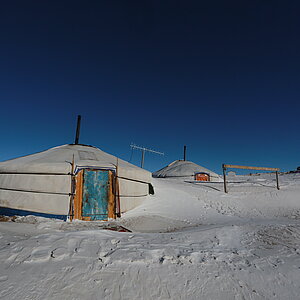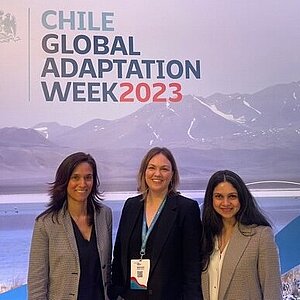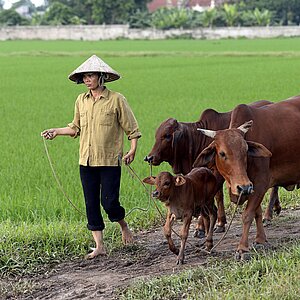How three islands work with the private sector for mutual benefit
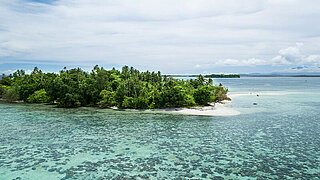
The Support Programme on Scaling up Climate Ambition on Land Use and Agriculture (SCALA) funded by the International Climate Initiative (IKI) supports Small Island Developing States (SIDS) working with the private sector on climate action.
SIDS are highly dependent on importing fuel, food, and bottled water, while exporting a few agrifood commodities. At the same time, SIDS are particularly vulnerable to the effects of climate change that threaten the very agrifood value chains on which these countries so heavily rely. Some SIDS require up to 20% of their GDP to effectively build resilience. Unfortunately, the necessary investments are often severely lacking.
SCALA supports private sector engagement
SIDS are now looking to engage the private sector. The prospect of working together is mutually beneficial. For the public sector, collaborating with the private sector offers the potential to unlock solutions to address multiple climate-related entry points within the agrifood system, thereby amplifying their impact. For the private sector, emerging agrifood investment opportunities present a chance not only to turn a profit but also to make a significant contribution to increased food security, climate resilience, and sustainable livelihoods in developing countries.
Therefore, FAO and UNDP have developed a Private Sector Engagement Facility (PSEF) that now operates in nine countries. The PSEF – part of the SCALA programme – offers a unique opportunity for the governments of the requesting countries to engage private sector actors in climate action in their agriculture, forestry, and land-use value chains and to access tools, training, innovations, and funding streams. The Solomon Islands, Belize, and São Tomé and Príncipe joined the PSEF in 2023 and 2024.
Exchanging firewood for biogas in the Solomon Islands

In the Solomon Islands almost 80% of the population live in rural, low-lying coastal areas relying on agriculture, forestry, and fisheries for food security and livelihoods. The Pacific Island country aims to enhance its energy and waste management infrastructure to reduce its vulnerability to climate change by increasing the affordability and accessibility of biogas in both urban and rural areas. To create a space where private sector investment is attractive and possible, the government requested SCALA’s support in conducting a feasibility study.
The results of the study revealed the potential for setting up a biogas plant using pig waste at the farm level and using residues from various sectors to generate electricity and gas for heating, cooking and lighting. Using biological matter to produce gas causes less harm to the environment. The study generated 3D digital reconstruction and engineering drawings of the site. With such reconstruction, piggery owners will be able to assemble a turnkey system or purchase pre-assembled components for a correctly sized biogas system. With 45 similar farms in the Guadalcanal province alone, replication potential is huge.
Exchanging emissions for good silvopastoral practices in Belize

Over 50% of the population in Belize is living in rural areas, mainly working in the agriculture and land-use sectors, including livestock and fisheries. These sectors are crucial for economic growth while contributing to increased food security and poverty alleviation.
Belize committed to advancing climate action by financing over 2,000 farmers to establish silvopastoral systems that include the rotational grazing of animals, integration of live fences and trees, shrubs and improved pastures in livestock farming systems. These systems are being designed to create more resilient ecosystems with enhanced soil health and erosion control, improved water conservation and retention and diversified income sources.
With the support of the PSEF a value chain assessment and an exploratory national market analysis for sustainable beef cattle value chain products is underway to enhance the climate resilience, competitiveness, and sustainability of the value chain.
Exchanging pesticides for organic alternatives in São Tomé and Príncipe
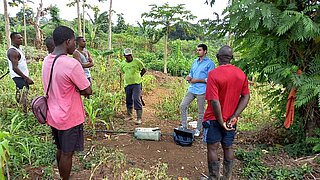
São Tomé and Príncipe is a large exporter of cocoa, coffee, copra, palm oil, coconut oil, and pepper. Unfortunately, the way these crops are cultivated involves substantial use of chemical fertilizers and pesticides, residues of which end up in land-based waste that leaches into groundwater layers and the sea. Storm surges, flooding, and rising sea levels exacerbate this.
One of São Tomé and Príncipe’s climate goals is to reduce the use of pesticides and chemical fertilizers by 25% and increase the use of organic products by 25% by 2030. This involves developing an ecosystem of organic bio-input manufacturers. With the support of the PSEF, the government was able to gather data and gain insights into potential market opportunities in a new report that assessed the commercial viability of bio-inputs for organic vegetable production and export.
Role of the private sector
The private sector can play a central role in promoting the adoption of climate-smart and sustainable production practices and greener behavior across value chains. They can drive innovation and support the establishment of standards. In turn, this helps both countries and the private sector expand markets in a climate resilience way and help farmers scale up sustainable practices. The SCALA programme has been addressing the need for the private sector to have robust evidence and data that can support strategic decision-making with 9 countries under the PSEF, as well as the other 12 SCALA countries.
The link has been copied to the clipboard
Contact
IKI Office
Zukunft – Umwelt – Gesellschaft (ZUG) gGmbH
Stresemannstraße 69-71
10963 Berlin











